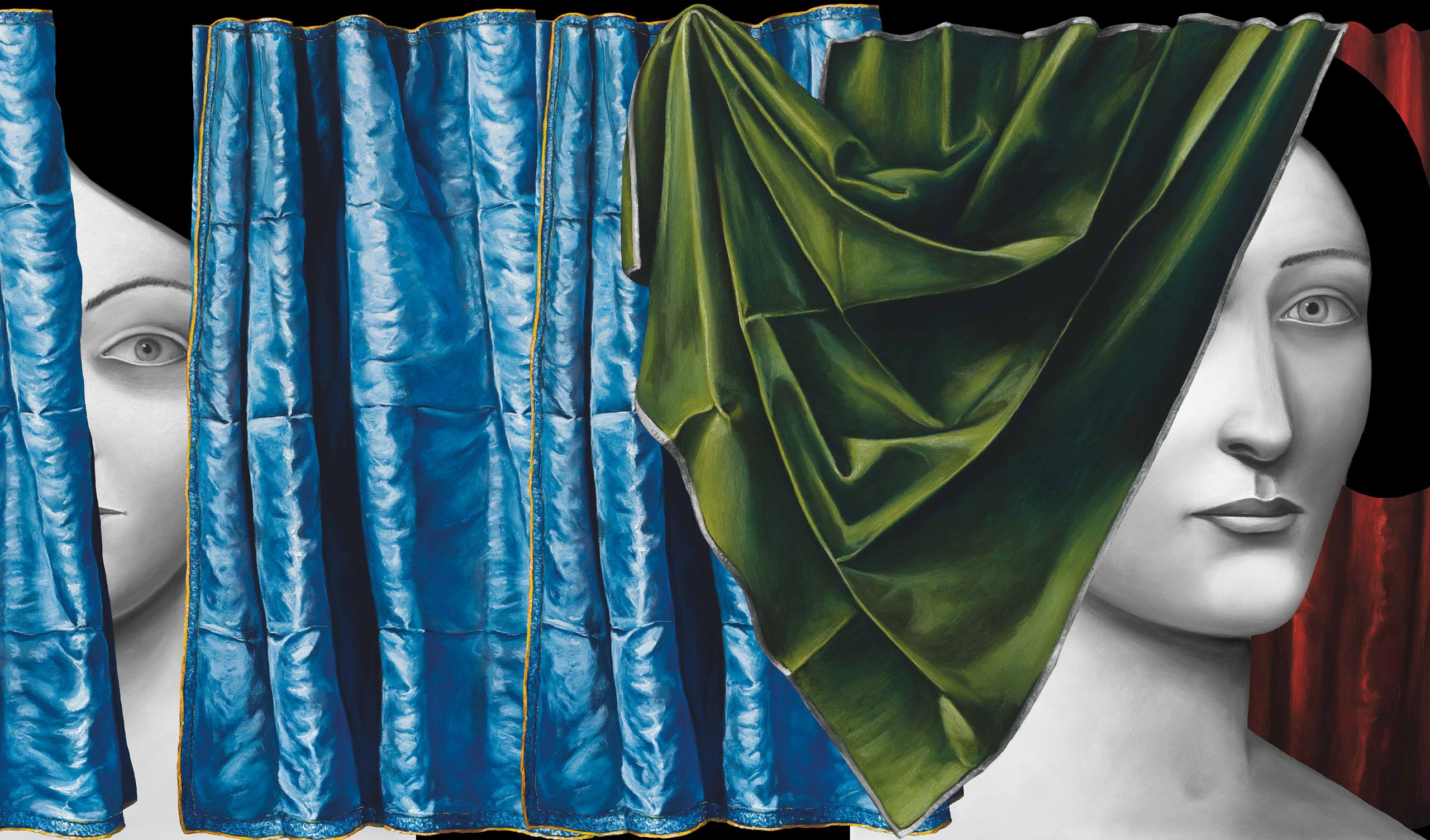Nicolas Party: Draw the Curtain
Sep 18, 2021–Oct 17, 2022

The exterior of the Hirshhorn’s iconic cylindrical building is the site of internationally renowned Swiss artist Nicolas Party’s newest artwork. Draw the Curtain (2021) wraps 360 degrees around the temporary scaffolding that encases the Museum building and spans a circumference of 829 feet, becoming the artist’s largest work to date. An original pastel painting digitally collaged and printed onto scrim, the site-specific commission transforms the Hirshhorn’s façade into a monumental canvas that stands out against the landscape of predominantly neoclassical buildings on the National Mall. The work will be on view through spring 2022 while the building’s envelope undergoes critical repairs.
Draw the Curtain comprises several anonymous faces partially hidden by draped curtains, gazing directly at the viewer no matter their vantage point around the building. Known for his unique visual language that simultaneously celebrates and challenges conventions of representational painting, Party steeps this work in art-historical technique and symbolism. The featured portraits, painted in black and white, are based on classical sculpture, while the curtains, painted in shades of green, blue, yellow, and red, are sampled mostly from 17th-century Dutch paintings. Painted in the tradition of trompe l’oeil, the work addresses themes of dupery and illusion and conjures a scenographic set. It invites passersby to peek backstage behind the “curtain” on the National Mall and examine both the collections housed within the Smithsonian and the contents of the distinctive government buildings dotting the surrounding landscape. Draw the Curtain reminds the viewer of the opacity of these spaces, while inviting them to consider what lies behind the façades of the buildings in the nation’s capital.
Draw the Curtain marks the second time Party’s artwork has been shown in Washington; the Hirshhorn hosted the artist’s Washington debut in 2017 with his solo exhibition sunrise, sunset.
Deinstallation of Nicolas Party’s Draw the Curtain will begin Oct. 17.
NICOLAS PARTY
Born in Lausanne, Switzerland, in 1980, Party is a figurative painter who has achieved critical admiration for his familiar yet unsettling landscapes, portraits, and still-lifes that simultaneously celebrate and challenge conventions of representational painting. His works are primarily created in soft pastel, an idiosyncratic choice of medium in the 21st century and one that allows for exceptional degrees of intensity and fluidity in his depictions of objects both natural and manmade. Transforming these objects into often abstracted, biomorphic shapes, Party suggests deeper connections and meanings. His unique visual language has coalesced in a universe of fantastical characters and motifs where perspective is heightened and skewed to uncanny effect.
In addition to paintings, Party creates public murals, pietra dura (a stone-inlay technique), ceramics, installation works, and sculptures, including painted busts and body parts that allude to the famous fragments of ancient Greece and Rome. His brightly colored androgynous figures vary in scale from the handheld to the monumental and are displayed on trompe l’oeil marble plinths of differing heights that upend conventional perspective. Party’s early interest in graffiti and murals—his projects in this arena have included major commissions for the Dallas Museum of Art and the Hammer Museum in Los Angeles—has led to a particular approach to the installation and presentation of his work. He routinely deploys color and makes architectural interventions in exhibition spaces in order to construct enveloping experiences for the viewer.
Party’s childhood in Switzerland imprinted upon him an early fascination with landscape and the natural world, and the influence of his native country places him firmly within the trajectory of Central European landscape painting. Points of reference in his work include celebrated 19th-century Swiss artists Félix Vallotton, Ferdinand Hodler, and Hans Emmenegger. Within his works is a 21st-century synthesis of the sorts of impulses and ideas that fueled the Renaissance and late-19th- and early-20th-century figurative painting, the compositional strategies of Rosalba Carriera and Rachel Ruysch, and the visions of such self-taught artists as Louis Eilshemius and Milton Avery.
Based in New York, Party studied at the Lausanne School of Art in Switzerland before receiving his Master of Fine Arts from Glasgow School of Art in Scotland.